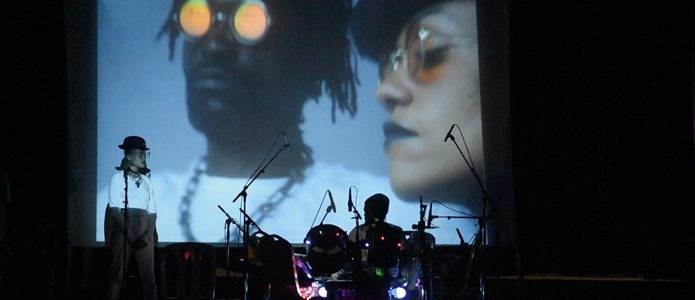Congo: Music in a Post-Colonial Context
The Silence after the Beat

How do raves and colonialism fit together? The artist Henrike Naumann playfully reversed colonial practices using the example of Belgian “New Beat,” an early version of European Techno.
Many Belgian music lovers are proud of “New Beat.” According to legend, New Beat was invented in Antwerp in 1987 when a DJ accidentally played a record at a slower speed. From then on it spread across the entire Belgian disco landscape. New Beat temporarily turned the little nation in the middle of the continent into Europe’s partying headquarters while being considered an assumedly “pure” Belgian musical genre that was not influenced by the Techno or House played in the 1980s by African-American DJs in the clubs of Detroit or Chicago.
This exclusion of African-American influences in the music suggests a “purity” of this style, which seems unlikely considering the globally interwoven history of music. So what happens if we not only consider American influences from Detroit or Chicago, but go a step further and look for the origins of New Beat in the former Belgian colony of Congo? What visible and audible influence did Congo's culture have on the development of this style of music in Western Europe?
Reinvention of New Beat
The artist Henrike Naumann playfully confronts the Belgian New Beat myth with her own legend by alleging instead that New Beat was invented in Kinshasa in 1987 by a Congolese DJ experimenting with a Belgian DJ’s records and playing them slower. The Belgian DJ took the idea of playing records at slow speeds back to Belgium and sold the idea as his own there in an allegory of exploitation and advantage that updates and reflects past colonial rule.Socially engaged resident
“During my residency in Kinshasa, I also dealt heavily with Belgium via the detour of Congo. The idea grew in me to explore the Belgian-Congolese link on an experimental level,” Naumann describes her approach. It was about “discussing colonial issues and injustices in a field where they would not be suspected, for example in electronic dance music. Is there even violence in music?” Exactly 30 years after the creation of New Beat, the artist teamed up with the Congolese vocalist Rachel Nyangombe and the musician Bebson de la Rue to search for the Congolese traces of the genre.“If you are looking for the beat in Kinshasa, Bebson de la Rue is the battery that runs and drives everything even when there’s a blackout,” says Naumann, describing the artist who has exerted a decisive influence on the development of a typical Kinshasa sound since the early 1990s. Bebson shapes the beat without electronic synthesizers, but from the materials found in the streets and backyards of Kinshasa. His drums are an infinitely expandable kit of objects: ventilation pipes, tyre rims, pot covers and plastic plates become sound and tone makers.
 Rachel Nyangombe and Bebson de la Rue on stage at Collège Boboto Kinshasa.
| Photo: Sektor Noha Matanga
After long recording and film sessions, the collaboration with singer Rachel Nyangombe and Bebson de la Rue culminated in an experimental performance at Collège Boboto, which was built in 1937 as a Catholic school for Belgian children. In the course of the performance, New Beat was introduced, but then handed over completely to the Congolese Performers.
Rachel Nyangombe and Bebson de la Rue on stage at Collège Boboto Kinshasa.
| Photo: Sektor Noha Matanga
After long recording and film sessions, the collaboration with singer Rachel Nyangombe and Bebson de la Rue culminated in an experimental performance at Collège Boboto, which was built in 1937 as a Catholic school for Belgian children. In the course of the performance, New Beat was introduced, but then handed over completely to the Congolese Performers. Rachel Nyangombe
| Photo: Sektor Noha Matanga
Once Naumann’s choreographed part was over and it was time for Rachel Nyangombe and Bebson to further develop the performance, at first nothing happened. “The mood was completely stoked up. After the slow but catchy historical New Beat tracks, the whole room was waiting for the new beat. But it just did not come and – except during a few brief moments – did not come the entire evening.” Extreme expectations were thus built up in the audience and then disappointed again and again. Just as the Belgian DJs once played the records slower, the performers slowed down and staggered the evening in an almost intolerable way. It was a harsh rebuttal of the hedonism of New Beat.
Rachel Nyangombe
| Photo: Sektor Noha Matanga
Once Naumann’s choreographed part was over and it was time for Rachel Nyangombe and Bebson to further develop the performance, at first nothing happened. “The mood was completely stoked up. After the slow but catchy historical New Beat tracks, the whole room was waiting for the new beat. But it just did not come and – except during a few brief moments – did not come the entire evening.” Extreme expectations were thus built up in the audience and then disappointed again and again. Just as the Belgian DJs once played the records slower, the performers slowed down and staggered the evening in an almost intolerable way. It was a harsh rebuttal of the hedonism of New Beat.